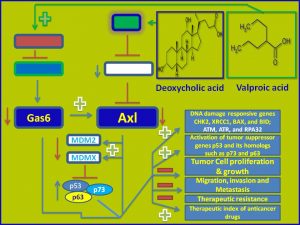Introduction: What they say:
A study from the Department of Radiation Oncology, Stanford University School of Medicine shows that “Inhibition of the GAS6/AXL pathway augments the efficacy of chemotherapies.” This study was published in the 3 January 2017 issue of the journal “Journal of Clinical Investigations” [one of the best journals General medicine with an I.F of 12.5+] by Prof. Amato J. Giaccia, Jennifer R. Cochran, Mihalis S. Kariolis, and others.
What we say:
On the foundation of this interesting finding, Dr L Boominathan PhD, Director-cum-chief Scientist of GBMD, reports that: Natural product-derived Anti-AXL therapeutics for enhancing the efficacy of chemotherapies: Combination of Valproic acid and Deoxycholic acid, decreases the expression of the AXL receptor and its activating ligand, GAS6, increases the expression of a number of tumor suppressor genes, increases therapeutic index of anticancer drugs, suppresses tumorigenesis, migration, invasion, and metastasis via up regulation of its target gene
From Significance of the study to Public health relevance:
Given that: (i) each year nearly 14 million people are diagnosed with cancer globally, and little more than half of them will die; (ii) cancer deaths globally are expected to be doubled by 2030; (iii) cancer treatment causes the highest economic loss compared to all the known causes of death worldwide, there is an urgent need to find: (i) a way to prevent an individual from being susceptible to cancer-by strengthening his/her own immune system (Cancer Immunotherapy); (ii) a cheaper alternative to the existing expensive anticancer drugs; (ii) a side-effect-free natural product-based drug; (iii) increase therapeutic index of anticancer drugs; (iv) a way to effectively treat and prevent metastatic progression and relapse of drug-resistant cancers.
What we infer from what they say:
Prof. Amato J. Giaccia’s research team has recently shown that AXL decoy receptor, MYD1-72: (1) has higher affinity for Gas6 compared to Axl; (2) inhibits the interaction between the AXL receptor and its activating ligand, GAS6;(3) increases the expression of DNA damage response markers such as gH2AX, 53BP1, CHK2, XRCC1, BAX, and BID etc.,; and (4) betters the therapeutic index of current standard-of-care chemotherapies in a number of advanced cancers.
From research findings to therapeutic opportunity :
This study suggests an Anti-AXL/Gas6 therapeutics for enhancing the efficacy of cancer chemotherapies. Both Valproic acid and Deoxycholic acid have individually been shown to function as anticancer agents (fig. 1). However, the detailed mechanistic insights is yet to emerge.[easy_payment currency=”USD”]

A therapeutic mix encompassing Valproic acid and Deoxycholic acid, by increasing the expression of its target genes, it may decrease the expression of Axl and Gas6 (fig. 1). Thereby, it may: (i) activate DNA damage signalling; (ii) decrease the expression of pro-survival proteins and the negative regulators of tumor suppressor p53 protein and its homologs such as MDMX and MDM2; (iii) decrease the expression of the negative regulators of tumor suppressor p53 homolog, p73 such as Zeb1; (iv) increase the expression of pro-apoptotic proteins, including tumor suppressor proteins; (v) decrease oncoproteins, such as β-catenin, c-Myc, Cyclin D1 etc., ; (vi) increase therapeutic index of standard chemotherapeutic drugs; and inhibit therapeutic resistance; (vii) decrease tumor survival; (viii) inhibit tumor proliferation and growth; (ix) inhibit self-renewal of cancer stem cells; (x) prevent metastatic dissemination; and (xi) promote tumor regression of metastatic cancers, including Mutant p53(R175H)-expressing tumors (fig.1).
Thus, pharmacological formulations encompassing “Valproic acid and Deoxycholic acid or their analogues or Valproic acid and Deoxycholic acid in combination with other known anticancer drugs” may be used to increase the efficacy of therapeutic index of anticancer drugs and inhibit metastatic progression of primary cancers.
Details of the Research findings:
Idea Proposed/Formulated (with experimental evidence) by: Dr L Boominathan Ph.D.
Amount: $50#
Undisclosed mechanistic information: How does a therapeutic mix encompassing Valproic acid and Deoxycholic acid decrease the expression of Gas6/Axl to increase the efficacy of therapeutic index of anticancer drugs?
Terms & Conditions apply http://genomediscovery.org/registration/terms-and-conditions/
For purchase and payment details, you may reach us at info@genomediscovery.org
#Research cooperation
References:
Web: http://genomediscovery.org or http://newbioideas.com/
Citation: Boominathan, L., Natural product-derived Anti-AXL therapeutics for enhancing the efficacy of chemotherapies: Combination of Valproic acid and Deoxycholic acid, decreases the expression of the AXL receptor and its activating ligand, GAS6, increases the expression of a number of tumor suppressor genes, increases therapeutic index of anticancer drugs, suppresses tumorigenesis, migration, invasion, and metastasis via up regulation of its target gene, 23/February/2017, 10.37 pm, Genome-2-Bio-Medicine Discovery center (GBMD), http://genomediscovery.org
Courtesy: When you cite, Kindly drop us a line at admin@genomediscovery.org

